IN FOCUS: Foot Locker crowds offer glimpse into cut-throat world of reselling sneakers
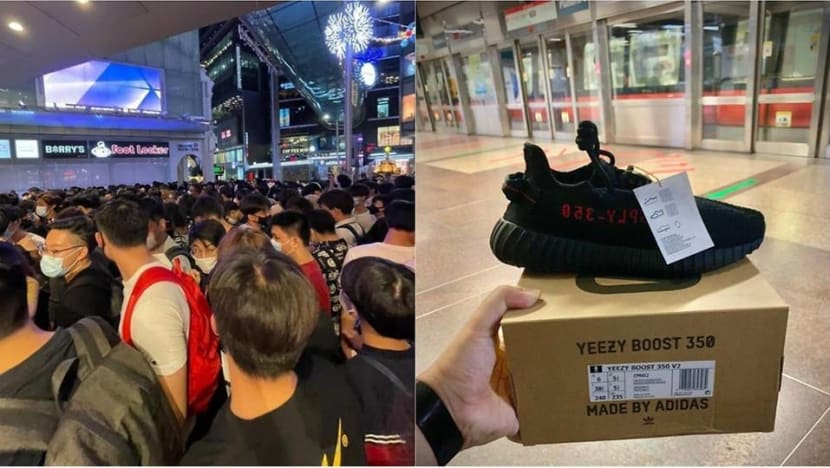
The crowds outside Foot Locker on the evening of Dec 4, 2020 were gunning for a pair of Adidas Yeezy Boost 350 V2 sneakers. (Photos: Ashwin, Travis)
SINGAPORE: On the evening of Dec 4 (Friday), pictures of crowds packed tightly together outside Foot Locker at Orchard Gateway quickly made their rounds on social media, alarming some members of the public.
It soon became clear that this was not any Hello Kitty or iPhone launch. People were willing to brave the pandemic to get their hands on Yeezy sneakers that would be even more profitable amid a thriving resale market.
One post on the sneaker and streetwear Facebook page Sole Superior SG summed it up: "We admire your hustle but we need to consider the implications of such crowds as well."
Some netizens wanted to know if Foot Locker would be penalised, given that restaurants have been ordered to close for 10 days for breaking COVID-19 safety measures.
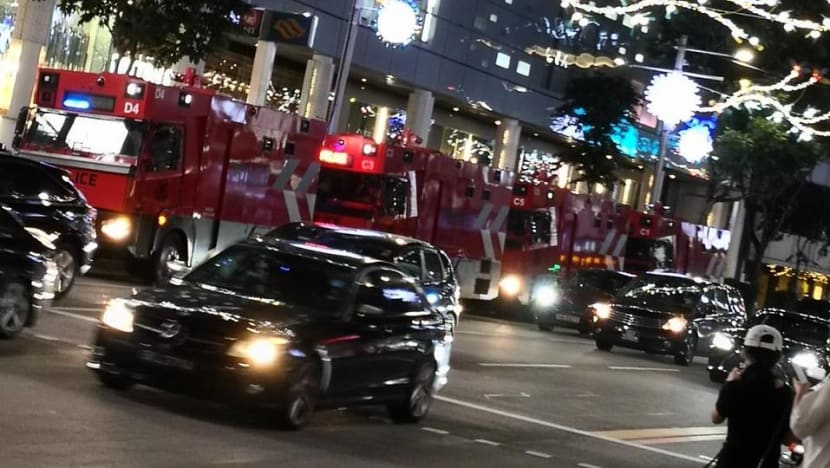
On the ground, four red police trucks rumbled up and parked nearby. The officers inside, from the Police Tactical Unit, are trained to maintain public order.
The reaction was swift.
In the early hours of Saturday, the Singapore Tourism Board (STB) said it was investigating the incident, after Foot Locker stores continued to hold events that drew large crowds despite repeated advisories.
Then on Saturday afternoon, STB ordered the Foot Locker outlet at Orchard Gateway to suspend physical operations for 10 days, having failed to comply with COVID-19 safe management measures.
But to understand whether the Yeezys were worth all that trouble, one has to delve deeper into the global, billion-dollar industry that is reselling sneakers.
While the limited-edition Adidas Yeezy Boost 350 V2 in black retailed for S$349, a pair could easily be resold for at least a S$100 profit, depending on their size.
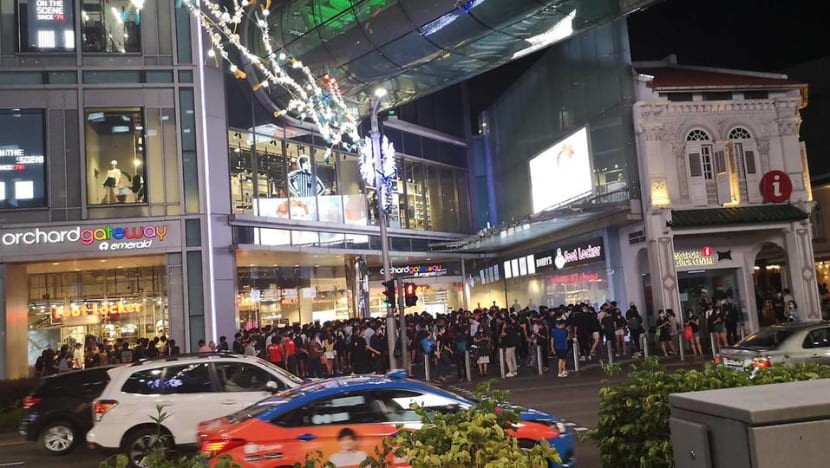
"It's the school holidays, and a lot of kids were actually going in there because it's an easy way to make money," long-time sneaker collector Dexter Tan, 33, told CNA. "It’s better than working like a whole day at McDonald's, you know."
Still, it is not just about buying low and selling high. Resellers use technology and various other schemes to be the first among thousands to buy, or "cop", multiple pairs of these valuable shoes at retail prices.
Some have made lucrative businesses out of it, holding on to the sneakers for a long time and watching their resale values spike, while others treat it as a hobby and a way to earn side income through quick flips.
"LIKE AN ARMS RACE"
At Orchard Gateway, the crowds turned up for the Yeezy "drop" without any formal publicity by Foot Locker on the exact date of the release, CNA's interviews with three sneaker resellers revealed.
The only general hint was in the Yeezy section of the Foot Locker Singapore website: "These trainers are hot – the hype is real ... Foot Locker is at the head of the latest trends, so you know it'll stock Yeezy boost trainers online and in select stores."
According to the resellers, sneaker stores never formally publicise these in-store releases beforehand. At most, it would be a social media post on the day of the event as it happened.
READ: This 16-year-old can rake in S$30,000 a month reselling sneakers
But these so-called random drops are rarely random for a number of reasons.
Resellers will try to work out the dates of these sales based on the sneaker's global release date, and the gaps between the store's previous online and physical releases, the resellers interviewed by CNA said.
Furthermore, they said some resellers could have an insider, sometimes working in the sneaker stores, notifying them in advance of physical releases. These resellers would then relay this information to members of their sneaker "cook groups", who pay to be the first to know about physical releases.
Those who have this advance information, either paid for or speculated on, might tell other sneaker fans in their inner circle. Naturally the word spreads like wildfire, leading sometimes to overnight queues outside the stores.
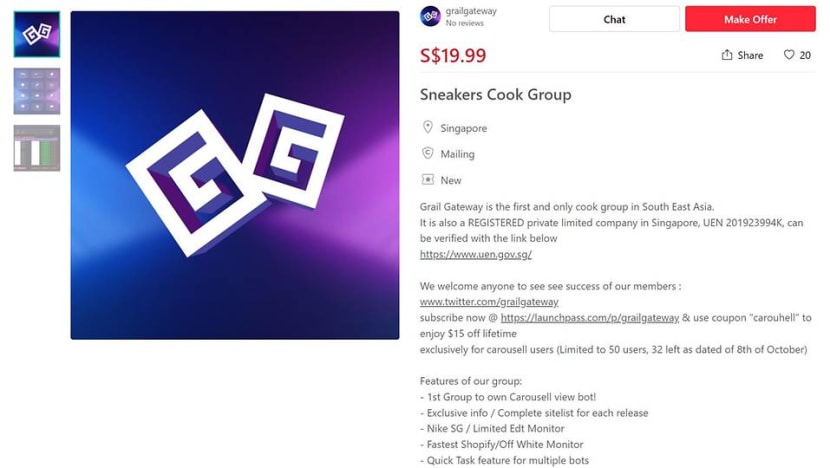
Physical releases might also be the best way to get hold of a pair, the resellers said.
For online sales, some people use thousand-dollar bot programmes to gain an edge in the first-come, first-served process, the resellers said, speeding through captcha puzzles and automatically checking out on multiple websites simultaneously.
Those who feel they could get lucky in online raffles might need to think twice. The bots can also generate multiple entries in online ballots, the resellers said, increasing users' small chances of being picked.
READ: Commentary: Making S$30,000 a month from sneakers? This is why nobody likes resellers
When asked if the resale market in Singapore has become a cut-throat industry, Mr Tan replied: "I think it's getting worse; it's increasingly harder to get sneaker releases now."
"With technology, it's like an arms race: Who can pay for the more expensive bots and therefore incur better chances of getting the shoes," he added.
"And therefore, for many people in the scene, and even myself, we tend not to be able to purchase the sneakers straight up just like that."
EVOLUTION OF THE SNEAKER SCENE
Mr Tan has been collecting sneakers since 2004, when he was a 16-year-old boy. In 2013, he co-founded Sole Superior, Singapore's first sneaker convention. So, he knows a bit about the local scene.
It has been around since the 90s, Mr Tan said, and in those days, sneaker fans also resold limited editions, albeit through forums and word of mouth.
Sneaker prices increased over the years due to inflation, demand and affluence, he said, with sneakers becoming a part of fashion trends on social media that influence what people bought.
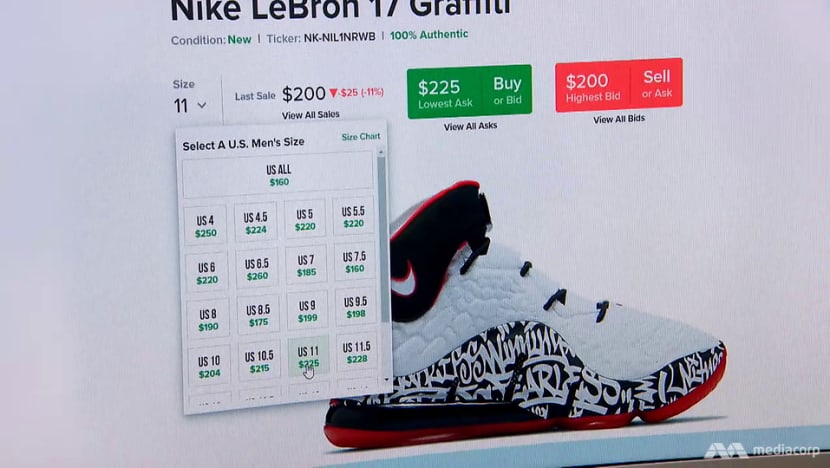
Ultimately, the secondary market is fuelled by greater awareness, and people willing to pay more for the coolest and rarest offerings.
"They also see some advantage of holding it, like stock or gold, and then the value increases and they can quickly sell it for a bit of profit," Mr Tan said. "I guess that's where the whole boom of the aftermarket scene has come from."
It looks like the scene is flourishing. In 2019, the Street Superior Festival, dubbed Singapore's premier sneaker and streetwear event, attracted about 19,000 guests over two-and-a-half days. Three-quarters of the guests were locals.
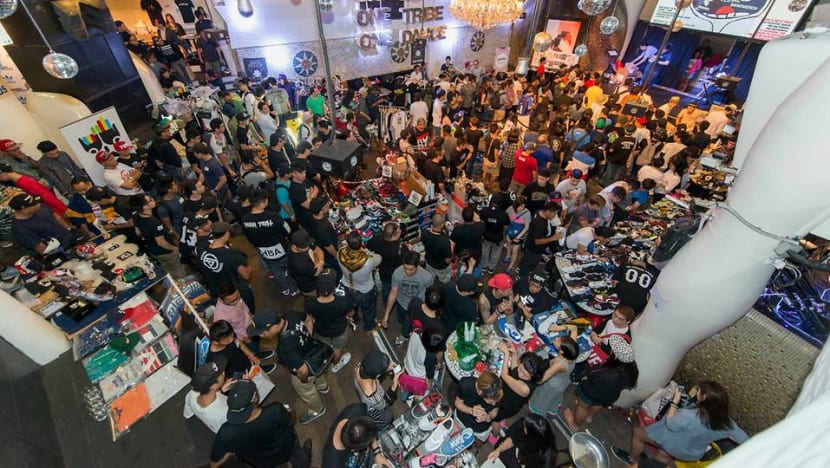
It is no wonder then that so many turned up at Foot Locker on Friday evening for the Yeezy release.
"Foot Locker didn't release any information about it, but people were just there to play on the chance that they were going to release it. And theoretically, they were actually going to release it the next day," Mr Tan said.
"It is just that most people really were able to predict the release patterns due to previous release dates and all that."
WHAT HAPPENED AT FOOT LOCKER
Sneaker reseller Remus Er said many would have been able to guess the outlet's Yeezy release date, as it would likely follow Adidas' release date.
"(Foot Locker) will hardly delay the drop," said the 16-year-old student, who started reselling sneakers two years ago.
Adidas Singapore had previously held an online ballot for the Yeezys, ahead of its launch that Saturday at noon.
"At the end of the day, Foot Locker was supposed to give out tickets (in a queue and ask the crowds) to go home, but due to the uncontrollable crowds, the release has been called off," Remus added.
STB had earlier said that investigations against Foot Locker were ongoing, and that it could face further enforcement action. An STB spokesperson told CNA on Monday that it could not share more details as investigations were still ongoing.
READ: Investigations under way after crowds gather outside Foot Locker at Orchard Gateway: STB
Foot Locker told CNA on Tuesday that its Orchard Gateway outlet had "proactively alerted" its locally hired security team to the growing crowd on Friday evening.
"We take the issues of crowding seriously and are continuing to work diligently and proactively to maintain safe distance for all of our shoppers and staff members," the spokesperson said.
READ: Foot Locker at Orchard Gateway ordered to suspend operations for breaching COVID-19 rules
The spokesperson did not offer more details in response to questions on whether it had publicised the event or anticipated the large crowds, and what safe management measures it had in place.
"The health and safety of our team members, customers and communities remain our top priority as we continue to navigate local COVID restrictions," the spokesperson added.
THE CHAOS OF IN-STORE RELEASES
Another sneaker reseller, who only wanted to be known as Ashwin, gave more insight on what goes down at physical sneaker release events.
The 29-year-old had attended an event at the same Foot Locker outlet on Nov 19. This was for the Nike Air Jordan 1 "Dark Mocha", which he said could earn him between S$200 to S$300 in profit when resold.
Ashwin had rushed to the store after being alerted by his friends, who are also avid sneaker resellers who had received reliable information on the release. Again, there had been no formal publicity by Foot Locker.
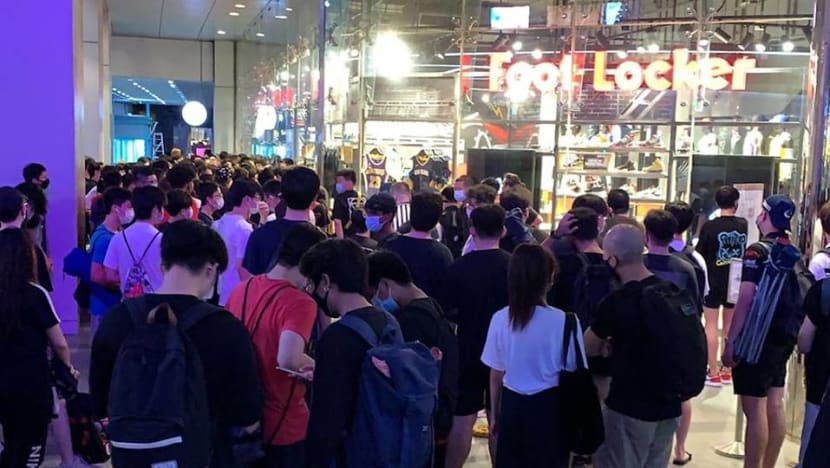
When he got there past 9pm, he said there were already more than 100 people.
"It was quite chaotic already," said Ashwin, who sells men's care products and began reselling sneakers at the start of this year. "People didn’t want to queue, people were trying their luck. Some were trying to squeeze in front."
In videos of the event seen by CNA, a Foot Locker sales assistant tried controlling the crowd, shouting to get people to form an orderly line.
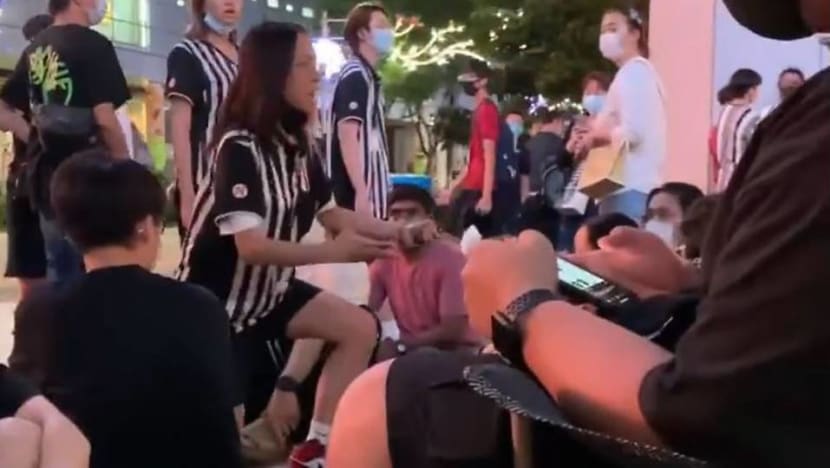
Ashwin said he managed to trump the competition by pre-empting where the queue would start, based on what sales staff were saying. He and his friends eventually managed to get tickets to buy two pairs of the Air Jordans, one of them in a smaller size.
Staff members then dispersed the crowds, he said. Those with tickets would return the next day to complete their purchases.
"My friends and I were in the first 30 in the queue, so we were lucky enough to be able to get two pairs," he said, pointing out that the smaller sized pair was more profitable as it catered to the female and kids' market.
PAYING PEOPLE TO QUEUE AND BUY
Even then, luck might not be enough.
Ashwin said some resellers would pay people, known as "proxies", to queue with them, allowing them to buy more pairs of the limited-quantity sneakers. Each customer would usually be restricted to one pair, and sometimes only in their own foot size.
Ashwin showed a picture of people he claimed were proxies, many of whom were youths, apparently being briefed by a known reseller during a sneaker drop at a Foot Locker outlet in Jewel Changi Airport.
These proxies could be paid anywhere between S$2 to S$100, depending on how much resale profit the sneaker could earn, he said, adding that there could be more than 20 of them tagged to one reseller.
"Some resellers bring like 13- to 14-year-olds to buy the kids' sizes, but using their card to pay," he said. "How can a 13-year-old have a card?"
READ: Southeast Asia is emerging as a hub of the global sneaker trade, with Singapore at its centre
Another sneaker reseller, who only gave his name as Travis, said he has seen resellers offer cash to young women on the street to help them buy sneakers in smaller sizes.
Even before that, Travis said some resellers would already be at the front of the queue, acting on advance insider information about the event.
"It’s just the matter of inside info," said the 26-year-old, who started reselling sneakers in 2013. "You got a mole in the shop, you can cop first-come, first-served."
Some overzealous resellers would also spend their time walking around sneaker stores just in case there was a random sale, Travis said. This would happen more frequently during periods when physical releases were expected to happen.
In the days ahead, Travis said resellers descended upon the Nike store in Jewel "like vultures". "Their job is to walk around and do visits to the stores every hour to check for in-store drops," he said.
Sure enough the next Wednesday, Nike stores at Jewel and VivoCity held physical releases for unclaimed Air Jordan pairs from the raffle. SUTL Life announced it in a Facebook post on the day itself.
A RETAILER'S PERSPECTIVE
The usual rules – only one pair each and only in your size – applied for this release. But the store imposed another condition: Buyers had to wear Air Jordan 1 sneakers to be eligible.
An SUTL Life representative told CNA this additional condition was one way of reducing crowds and identifying "die-hard fans ... that were genuinely there to buy".
"We knew that particular pair of Air Jordan shoes was highly sought after," SUTL Sports Retailing group business director Alex Tay said.
"To prevent large crowds which might result in an uncontrollable situation, we only announced it on the very day."
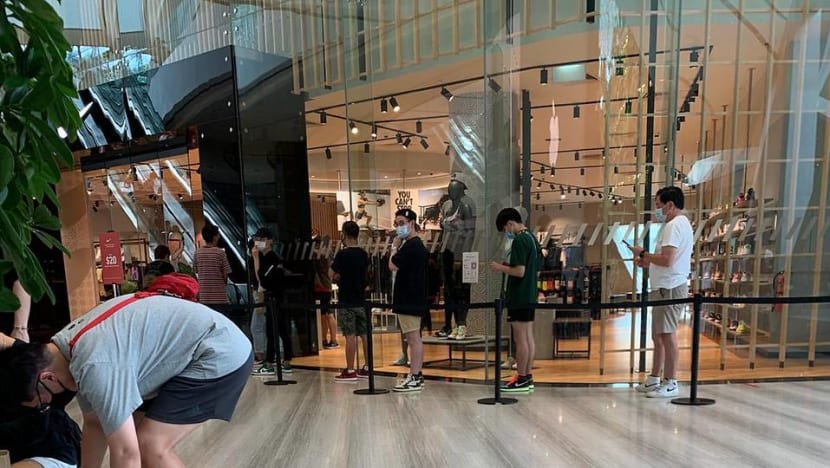
Pictures from the event at the Jewel outlet showed that crowds looked to be manageable. But Travis, who was there, said this was partly because it was not held during the school holidays, unlike the most recent Foot Locker event. Jewel's not-so-central location was also a factor, he said.
When asked why the store chose to hold a physical event instead of another online raffle or release, Mr Tay said the decision was customer-focused.
"For raffles where higher quantities are uncollected, we typically go through a second raffle. But in this case, both stores were left with only a few pairs of sneakers in very limited sizes," he added.
"After much consideration, we decided to release the remaining unpicked quantities to avoid customers’ disappointment."
ONLINE BOTS
Travis suggested that despite the pandemic, retailers might still opt for physical events over online releases or ballots to "give people a chance to cop" the sneakers.
"Online, bots eat the stocks," he said, adding that resellers can also gain an advantage in raffles by generating multiple entries using bots.
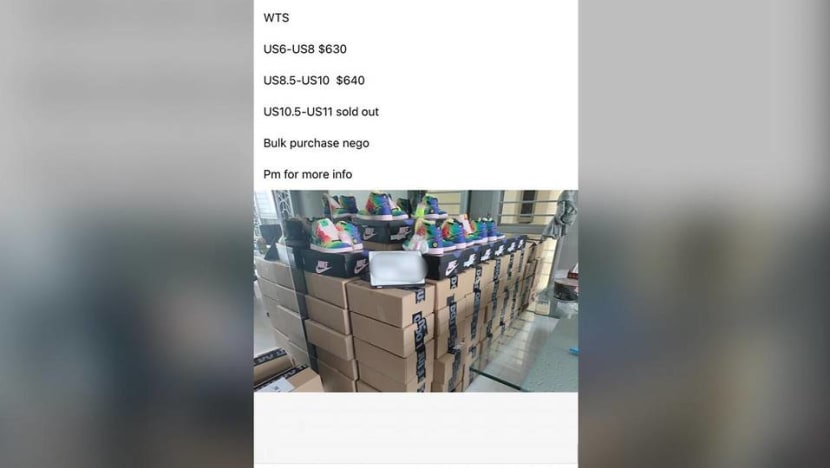
To illustrate this point, Travis produced a screenshot from a sneaker marketplace on Facebook, where a reseller showed off at least 40 boxes of brand new Air Jordans. This was likely the work of a bot, Travis said.
"It's a never-ending race for online brands and retailers to fight against such technology," said Mr Tan, the sneaker collector.
"They have been coming up with two-factor authentication, that kind of stuff, to prevent people from bulk buying. But it's a bit difficult, because technology will always fight itself."
Mr Tan said he has heard of people paying S$11,000 to S$12,000 for "solid" bots, a far cry from the S$100 programmes many years ago, when Nike had just launched its website.
READ: Commentary: The rise and rise of the sneaker
While he acknowledged that the well-to-do are more likely to succeed as resellers, he warned against the idea that flipping sneakers is easy.
"Even though the guy had 100 pairs, I can tell you for a fact that he would have worked very hard, because bots also require some sort of manual input," he added.
"So it's not as easy as people think: 'I just pay money to get it.' You need to have a bit of an entrepreneurial spirit as well."
DEATH OF SINGAPORE'S SNEAKER SCENE?
But Mr Tan is worried that an overabundance of this entrepreneurial spirit, or hustle, could cause the downfall of the local sneaker scene, noting that at the rate things are going, it will eventually "implode" from declining demand.
In fact, he said this had happened about a decade ago, when people lost interest because it was just so difficult to compete with hustlers on the retail market, and to fork out exorbitant amounts on the resale market.
"Imagine after months of trying, you just fall short at every sneaker you want," he added. "You will get frustrated and leave."
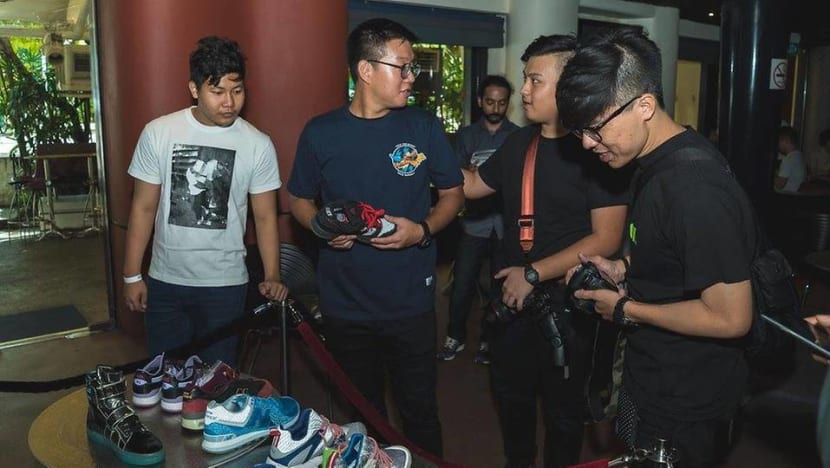
Mr Tan said many have been driven out this way, especially when they begin to have other financial commitments like starting a family.
New sneaker enthusiasts will also be deterred from developing their hobby, he said, as those who are young and inexperienced might not be able to afford it.
"It is lucrative to a point, but then that’s the sad thing," he stated. "We are now bounded by it being a monetary transaction, and therefore people get sick of it."
APPRECIATING THE FINER POINTS
Nevertheless, Mr Tan said it is not too late to stop the rot.
He urged resellers to help out genuine sneaker aficionados when they can, by agreeing to sell at lower prices that can still make them a profit.
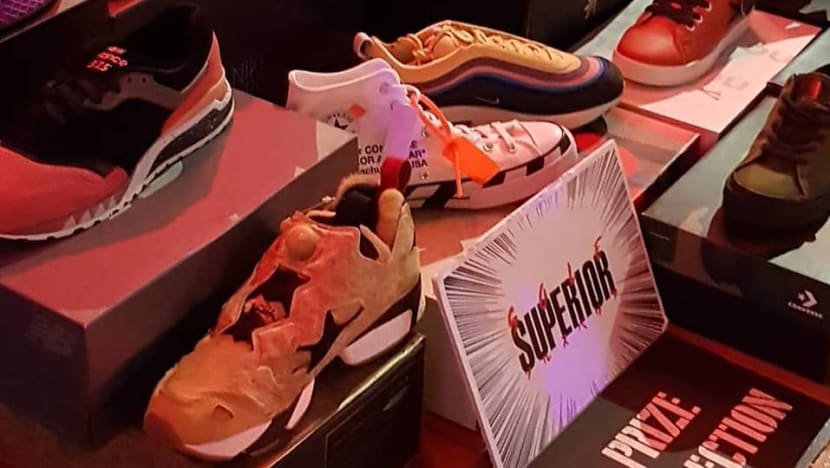
In the years following the previous crash, Mr Tan recalled the scene picking up again as sneaker fans "started going back to the whole idea of it being a community, hobby group and all that".
"I've known of resellers who give back, like run a charity drive when they sell their own sneakers," he said.
"Or for example, when they are doing community events, they will do on-site freebies. So like when you buy sneakers, you get a free T-shirt."
Mr Tan said he does not begrudge resellers, acknowledging it is a legitimate business and an iron rice bowl for some, with running costs involved.
"To be frank, if I had the means and technological know-how, I would also do it," he added. "Because it's being able to earn money from your home."
Mr Tan said he just wants to see the scene become less "hostile", pointing out that nowadays, "it's a bit scary how much people are into sneakers to a point that they are so aggressive".
"For me, having collected sneakers for this many years, I realise that I can love sneakers without buying them," he added. "Once people realise that, not every shoe is a must-have."
















